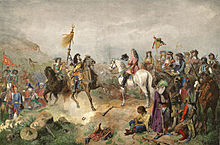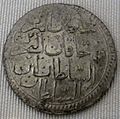Suleiman II of the Ottoman Empire
This article needs additional citations for verification. (September 2016) |
| Suleiman II سليمان ثانى | |||||
|---|---|---|---|---|---|
| Caliph of Islam Amir al-Mu'minin Sultan of the Ottoman Empire Custodian of the Two Holy Mosques | |||||
 | |||||
| 20th Ottoman Sultan (Emperor) | |||||
| Reign | November 8, 1687 – June 22, 1691 | ||||
| Predecessor | Mehmed IV | ||||
| Successor | Ahmed II | ||||
| Born | April 15, 1642 | ||||
| Died | June 22, 1691 or June 23, 1691 (aged 49) | ||||
| Consorts | Hatice Kadın Behzat Kadın İvaz Kadın Süylün Kadın Şehsuvar Kadın Zeyneb Kadın | ||||
| |||||
| Dynasty | House of Osman | ||||
| Father | Ibrahim | ||||
| Mother | Saliha Dilaşub Sultan | ||||
| Religion | Sunni Islam | ||||
| Tughra |  | ||||
Suleiman II bin Ibrahim bin Ahmed bin Mehmed (April 15, 1642 – June 22/23 1691) (Ottoman Turkish: سليمان ثانى Süleymān-i sānī) was the Sultan of the Ottoman Empire from 1687 to 1691. After being brought to the throne by an armed mutiny, Suleiman and his grand vizier Fazıl Mustafa Pasha were successfully able to turn the tide of the War of the Holy League, reconquering Belgrade in 1690, as well as carrying out significant fiscal and military reforms.
Early life
The younger brother of Mehmed IV (1648–87), Suleiman II was born at Topkapı Palace in Constantinople and had spent 46 years of his life in the kafes (cage), a kind of luxurious prison for princes of the blood within the Topkapı Palace (it was designed to ensure that none could organize a rebellion).
His mother was a Serb woman originally named Katarina, known as Saliha Dilaşub Sultan.[1][2][3]
Reign
Ottoman–Habsburg War

Shortly before assuming the throne, the Ottomans suffered a devastating defeat at the second Battle of Mohács. Suleiman II shrewdly appointed Köprülü Fazıl Mustafa Pasha as his Grand Vizier, leading to the reconquest of Belgrade in 1690. Even so, when Russia joined an alliance of European powers, the Ottomans lost the support of their Crimean allies, who were forced to defend themselves from Russian invasion.
Under Köprülü's leadership the Ottomans halted an Austrian advance into Serbia and crushed an uprising in Macedonia and Bulgaria until Köprülü Fazıl Mustafa Pasha was killed in the Battle of Slankamen by Austrian forces. Suleiman II died at Edirne Palace in 1691.
Relations with the Mughal Empire
In 1688 the Ottoman Sultan Suleiman II urgently requested for assistance against the rapidly advancing Austrians, during the Ottoman–Habsburg War however the Mughal Emperor Aurangzeb and his forces were too heavily engaged in the Deccan Wars against the Marathas to commit any formal assistance to their desperate Ottoman allies.[4]
Gallery
-
Tughra of Suleiman II
-
Suleiman II in Croatia
-
Coin of Suleiman II
-
Suleiman II
-
Suleiman II
See also
Sources
- ^ "Sultan II. Süleyman Han". Republic of Turkey Ministry of Culture and Tourism. Retrieved 2009-02-06.
- ^ Günseli İnal; Semiramis Arşivi (2005). Semiramis: Sultan'ın gözünden şenlik. YKY. p. 27. ISBN 978-975-08-0928-6.
Siileyman'in annesi Sirp Katrin yani Dilasiip Hatun
- ^ Ali Kemal Meram (1977). Padişah anaları: resimli belgesel tarih romanı. Öz Yayınları. p. 325.
- ^ Mughal-Ottoman relations: a study of political & diplomatic relations ... - Naimur Rahman Farooqi - Google Boeken. Books.google.com. 1989. Retrieved 29 April 2012.
External links
![]() Media related to Suleiman II at Wikimedia Commons
Media related to Suleiman II at Wikimedia Commons





